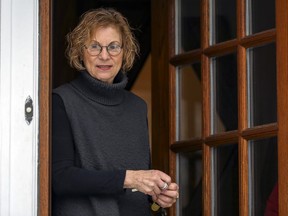“I think it’s a disgrace,” says Ella Amir, executive director of AMI-Quebec. “To me, this is really a model for (substance) recovery.”

In an internal memo, dated June 12, MUHC officials announced after the closing in December, “complex cases will be referred to the CHUM,” the French-language Centre hospitalier de l’université de Montréal. Mental-health and addiction-recovery advocates met with the MUHC on Thursday in a desperate bid to persuade Quebec’s largest hospital network to reconsider — to no avail.
“This is a pretty unique program. It’s based mostly on volunteers. To me, this is really a model for (substance) recovery. Recovery is not happening in a psychiatrist’s office. It happens in the community. And I think that what these mentors and mentees are doing is really remarkable.
“So I think it would be an absolute shame if this program were to close,” Amir added.
In the June 12 memo, Colleen Tim, director of multidisciplinary services, and Dr. Karine Igartua, chief of psychiatry, acknowledged closing the addiction day program may give rise to “grief, anxiety and anger.” But they also suggested the closing could engender feelings of “excitement and hope about new opportunities.”
“As of last week, we have closed our wait list for elective detox admissions,” they explained in the memo.
“The current addiction day program and outpatient groups will close in a step-wise fashion with all current services closing completely by December.
“In keeping with mandates of the various partners in the Réseau (the Quebec health network), patients requiring primary addictions services will be reoriented to community programs and those with complex cases will be referred to the CHUM,” the memo added.
Although the memo does not frame the closing as a financial cutback, the need to trim costs may have influenced the decision.
“They are talking about budget,” Amir said. “This is also ridiculous, in my view. I can raise this money. You know, they ask for $90,000, they got $60,000 or $65,000. I think that the problem is commitment. There is really no commitment for the program.”
The decision to close the ground-breaking program comes as Quebec — like other provinces and U.S. states — is grappling with an opioid crisis. According to statistics from the Institut national de santé publique du Québec, more than 500 people in the province died of suspected overdoses of opioids or other substance from October 2021 to September 2022.
Pierre Hurteau, a patient-rights advocate at the MUHC, expressed concern about the potential linguistic effect of transferring English-speaking patients to the French-language CHUM.
“In the current context of (the health network’s) disorganization, the (ministry) is multiplying service agreements between establishments or territories, but this doesn’t always work to the advantage of patients,” Hurteau said.
In response to queries by The Gazette, an MUHC spokesperson sought to play down the significance of the day addiction program.
“The addictions program has been in operation in its current format without modernization of the services for many years,” Bianca Ledoux-Cancilla said in an email.
“It offers a very specific treatment to only a limited portion of patients who battle addictions, those functional enough to attend such a program. It has not been able to properly serve populations with dual diagnosis or those who require a more flexible or harm reduction model of care. It is not in keeping with the mandate of the MUHC within the health-care network … where this mandate has been given to the CHUM.”
Ledoux-Cancilla asserted the CHUM offers addiction treatment in French and English. “This current plan has been made between the clinical and management leadership of the MUHC and the CHUM and follows ministry recommendations,” she added.